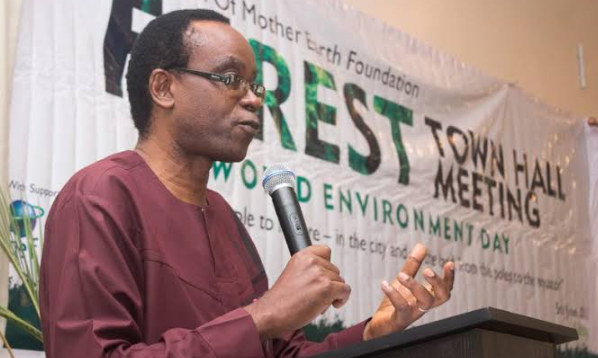
Dr Nnimmo Bassey, Executive Director of the Health of Mother Earth Foundation (HOMEF), has cautioned that Nigeria’s embrace of genetically modified organisms (GMOs) threatens the country’s food sovereignty, biodiversity, and cultural heritage.
Delivering a keynote address at the National Symposium on GMOs held on 1 September 2025, Bassey argued that the root causes of food insecurity in Nigeria—ranging from farmer-herder conflicts and banditry to poverty, poor support for local farmers, inequality, inflation, and climate change—are being overlooked in favour of a technological “quick fix.”
"When solving a problem, dig at the roots instead of just hacking at the leaves,” he said, stressing that GMOs do not address the fundamental drivers of hunger.
Bassey traced the introduction of GMOs in Nigeria to the 2015 National Biosafety Management Agency (NBMA) Act, expanded in 2019 to allow gene editing and synthetic biology. He criticised what he described as a flawed regulatory foundation, where the promotional agency for biotechnology—the National Biotechnology Research and Development Agency (NBRDA)—was created even before a biosafety law was in place.
“This cart-before-the-horse approach,” he said, “has weakened regulation and blurred the lines between promoters and regulators of biotechnology in Nigeria.”
According to Bassey, nearly three decades after their global introduction, GMOs have failed to eliminate hunger. Instead, they have degraded soils, reduced biodiversity, and concentrated control of food systems in the hands of a few corporations.
He cited the case of Nigerian cotton farmers in 2024 who experienced poor yields with genetically modified cotton, warning that farmers could soon become dependent on corporate seed suppliers whose products lose viability after the first planting.
“GMOs ride on the global fetishisation of technology, yet they represent not an option, but a paradigm shift that erodes natural systems and traditional knowledge,” he noted.
Bassey framed the promotion of GMOs as part of a larger “colonial subversion” of African agriculture. He argued that colonial systems deliberately undermined local food systems by enforcing cash-crop economies, displacing communities, and altering dietary preferences to favour imported or hybridised foods.
“Farmers’ saved seeds are falsely deemed inefficient, yet these indigenous varieties have sustained biodiversity and human health for centuries,” he said. “The genetic modification of our staples is an assault on both our environment and our culture.”
Dr Nnimmo Bassey emphasised that Nigeria does not need GMOs to achieve food security. He pointed to Tanzania’s recent report of 128% food sufficiency without GMOs, achieved through support for local farmers and organic practices. He also highlighted that in Nigeria, over 40% of food is lost to poor storage and processing, a problem that requires infrastructural solutions rather than biotechnology.
He called for a “decolonisation” of agriculture through: Preservation of indigenous crop and animal varieties, stronger extension services and rural infrastructure, farmer-led agricultural policies, investment in research on healthy soils and resilient crops, a moratorium on agricultural biotechnology and harmful agrochemicals.
Bassey concluded with an urgent appeal for Nigerians to reclaim control over their food systems.
“Nigeria is at a critical crossroads,” he said. “This is not just another symposium. It is a space to demand liberation of our food systems, to protect our environment, and to secure food sovereignty for present and future generations.”